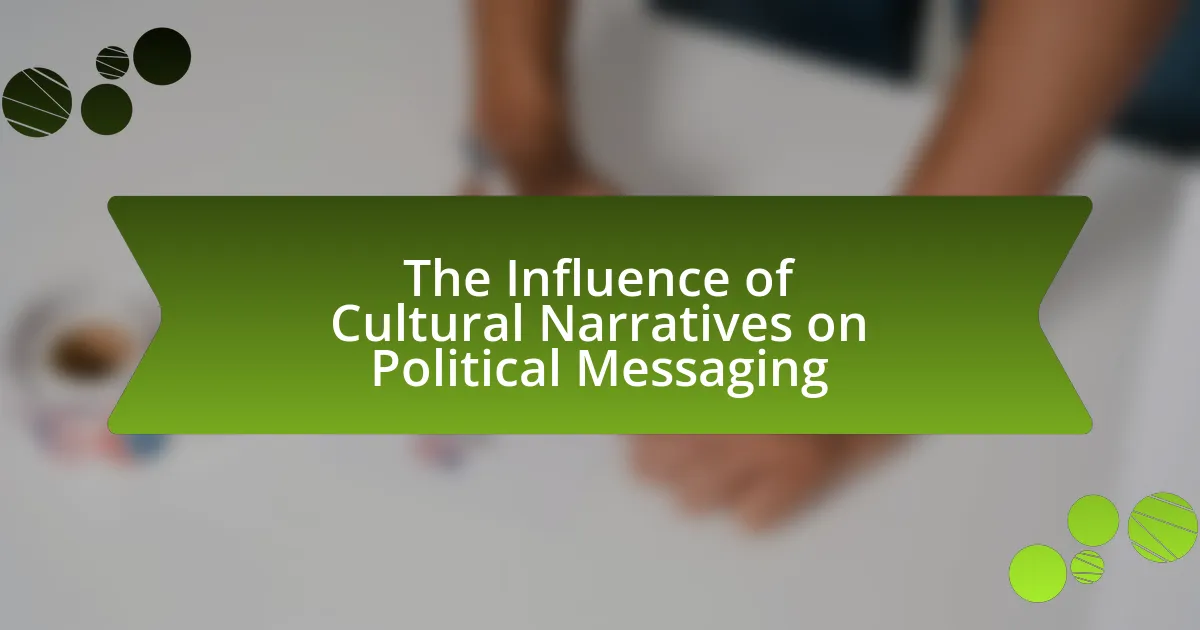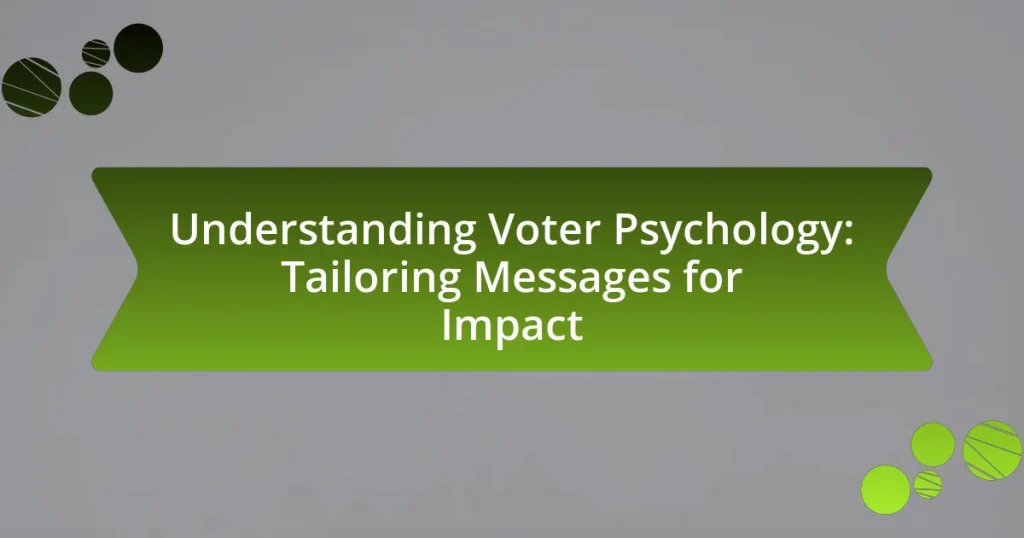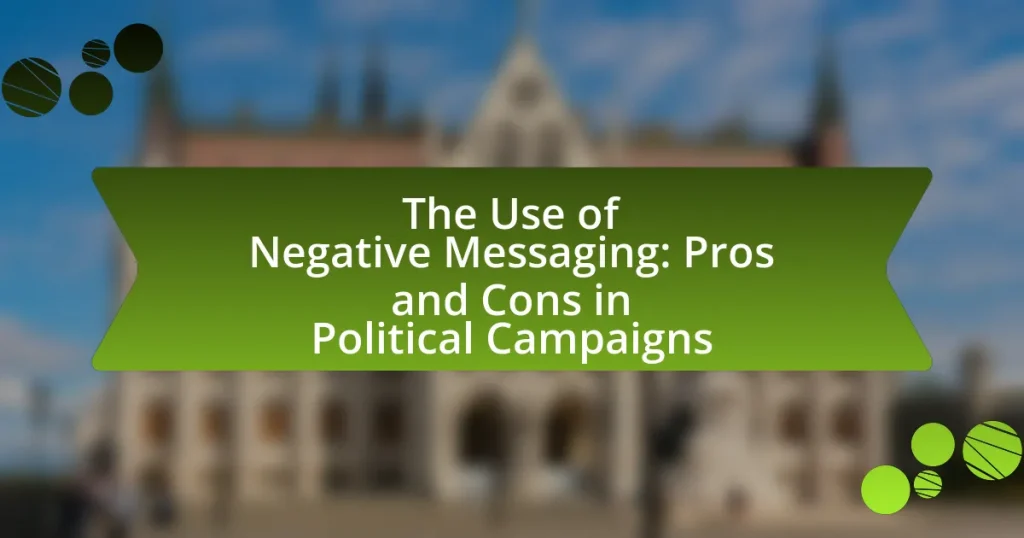Cultural narratives are shared stories and frameworks that shape societal beliefs, values, and identities, significantly influencing individual and collective behaviors. This article explores the role of cultural narratives in political messaging, detailing how they affect public opinion, voter behavior, and political ideologies. Key elements of cultural narratives, their evolution over time, and their impact on political communication strategies are examined, alongside the ethical considerations and best practices for political communicators. The discussion highlights the importance of aligning political messages with cultural narratives to enhance engagement and ensure cultural sensitivity.
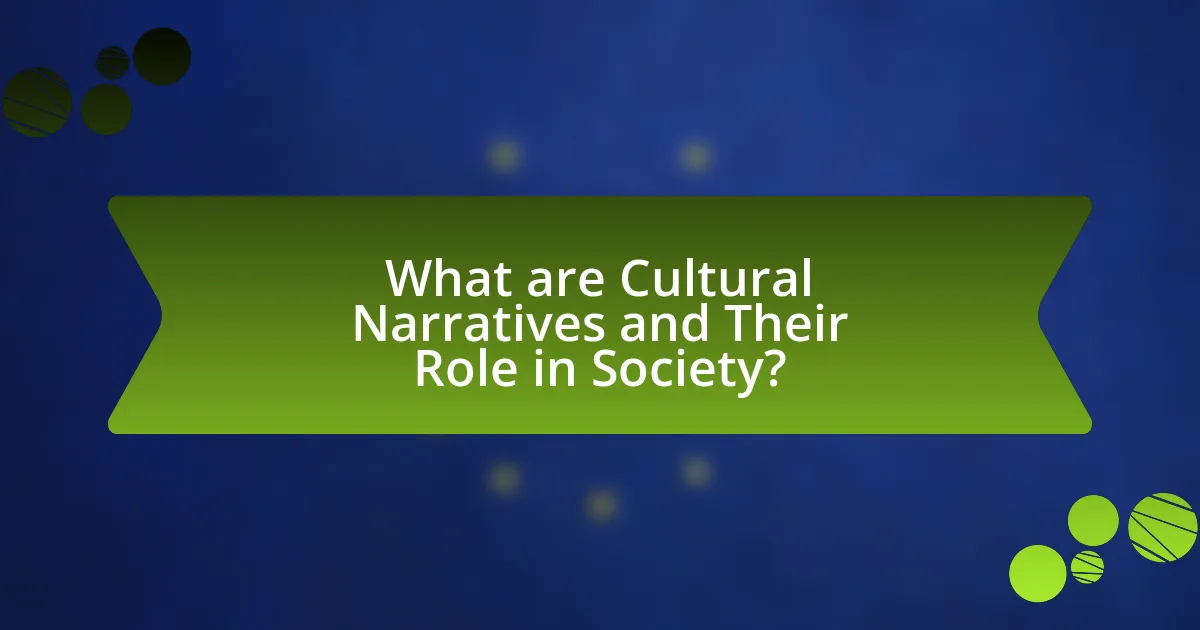
What are Cultural Narratives and Their Role in Society?
Cultural narratives are shared stories and frameworks that shape a society’s beliefs, values, and identity. These narratives influence how individuals perceive their world and interact with one another, often guiding social norms and behaviors. For instance, cultural narratives surrounding democracy can promote civic engagement and participation in political processes, as evidenced by studies showing that communities with strong democratic narratives tend to have higher voter turnout rates. Additionally, cultural narratives can reinforce or challenge power structures, impacting political messaging by framing issues in ways that resonate with the public’s existing beliefs and experiences. This dynamic illustrates the significant role cultural narratives play in shaping societal discourse and political engagement.
How do cultural narratives shape individual and collective identities?
Cultural narratives shape individual and collective identities by providing frameworks through which people interpret their experiences and understand their place in society. These narratives influence values, beliefs, and behaviors, creating a shared sense of belonging and purpose among individuals within a group. For example, the narrative of the American Dream has historically shaped the identity of many Americans by promoting ideals of opportunity and success through hard work, which in turn influences collective identity and social cohesion. Research by scholars such as David K. Brown in “Cultural Narratives and Identity Formation” highlights how these narratives can reinforce social norms and expectations, thereby impacting both personal identity and group dynamics.
What are the key elements that constitute a cultural narrative?
Key elements that constitute a cultural narrative include shared values, collective memory, symbols, and storytelling. Shared values represent the beliefs and principles that a community holds, shaping their identity and guiding behavior. Collective memory refers to the historical experiences and events that are remembered and passed down through generations, influencing current perspectives. Symbols serve as representations of cultural ideas and emotions, often encapsulating complex meanings in a single image or concept. Storytelling is the method through which narratives are conveyed, allowing individuals to connect emotionally and cognitively with the cultural context. These elements work together to form a cohesive narrative that influences social cohesion and political messaging.
How do cultural narratives evolve over time?
Cultural narratives evolve over time through processes such as reinterpretation, adaptation, and the influence of social, political, and technological changes. These narratives are shaped by collective experiences and historical events, which lead to shifts in societal values and beliefs. For instance, the narrative surrounding civil rights in the United States transformed significantly from the 1960s to the present, influenced by landmark legislation, social movements, and changing demographics. This evolution is evidenced by the increasing recognition of diverse voices and perspectives in contemporary discussions, reflecting a broader understanding of equality and justice.
Why are cultural narratives significant in political contexts?
Cultural narratives are significant in political contexts because they shape public perception and influence political behavior. These narratives provide a framework through which individuals interpret political events and policies, often aligning them with shared values and beliefs. For instance, during the civil rights movement, narratives of equality and justice mobilized public support and framed the struggle in moral terms, leading to significant legislative changes like the Civil Rights Act of 1964. This demonstrates how cultural narratives can effectively galvanize collective action and alter political landscapes by resonating with the populace’s identity and experiences.
What impact do cultural narratives have on public opinion?
Cultural narratives significantly shape public opinion by framing issues, influencing perceptions, and guiding collective beliefs. These narratives provide context and meaning to social phenomena, often leading individuals to align their views with the dominant cultural story. For instance, research by the Pew Research Center indicates that narratives surrounding immigration have shifted public attitudes, with stories emphasizing personal experiences leading to greater empathy and support for immigrant rights. This demonstrates that cultural narratives not only reflect societal values but actively mold public sentiment and policy preferences.
How do cultural narratives influence political ideologies?
Cultural narratives significantly shape political ideologies by framing the way individuals interpret social issues and political events. These narratives provide a shared context that influences collective beliefs and values, often guiding political behavior and party alignment. For instance, the narrative of the American Dream has historically promoted individualism and capitalism, leading to a political ideology that favors free-market policies. Research by George Lakoff in “Don’t Think of an Elephant!” illustrates how metaphors and narratives can shape public perception and policy preferences, demonstrating that the stories told within a culture can directly impact political discourse and voter behavior.
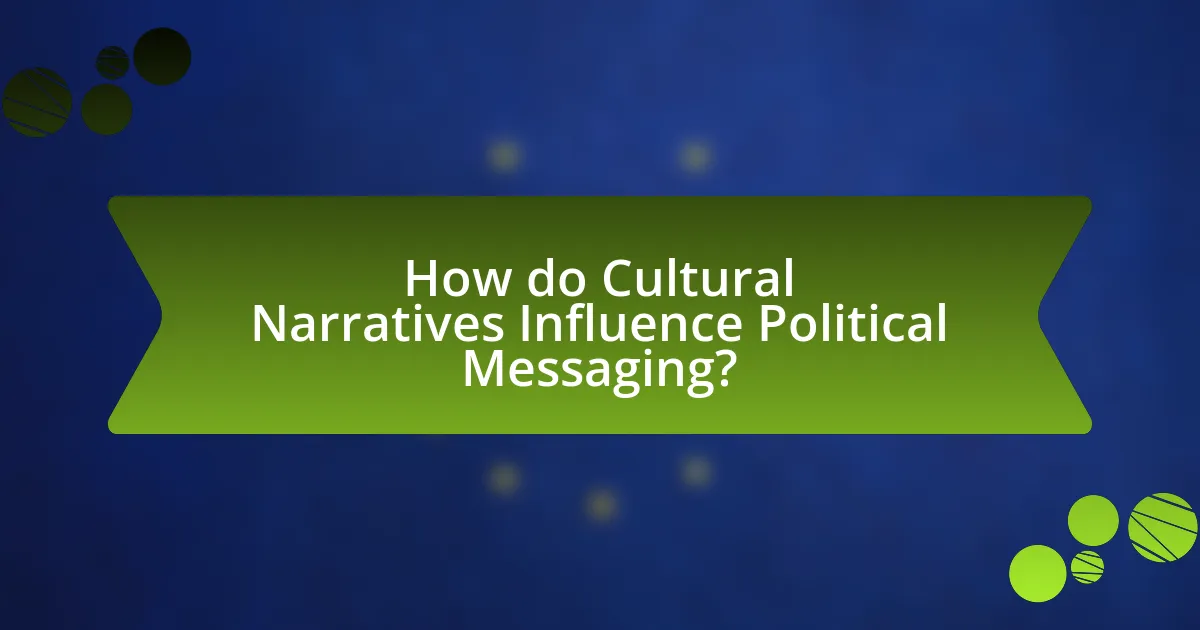
How do Cultural Narratives Influence Political Messaging?
Cultural narratives significantly influence political messaging by shaping the values, beliefs, and identities that resonate with specific audiences. These narratives provide a framework through which political messages are interpreted, making them more relatable and persuasive. For example, during the 2016 U.S. presidential election, candidates utilized narratives around American exceptionalism and patriotism to connect with voters, framing their policies in a way that aligned with these cultural values. Research indicates that messages aligned with cultural narratives are more likely to be accepted and shared, as they tap into existing societal norms and emotional responses, thereby enhancing their effectiveness in political communication.
What strategies do politicians use to incorporate cultural narratives into their messaging?
Politicians use several strategies to incorporate cultural narratives into their messaging, including storytelling, symbolism, and appeals to shared values. Storytelling allows politicians to connect emotionally with their audience by framing their policies within relatable narratives that resonate with cultural experiences. For example, Barack Obama frequently used personal anecdotes and historical references to create a narrative of hope and change, which aligned with American ideals.
Symbolism plays a crucial role as well; politicians often utilize culturally significant symbols to evoke emotional responses and reinforce their messages. For instance, during campaigns, candidates may adopt national symbols, such as flags or historical figures, to align themselves with patriotic sentiments.
Additionally, appeals to shared values involve referencing common cultural beliefs or traditions to foster a sense of unity and identity among constituents. This strategy was evident in Donald Trump’s messaging, which often invoked themes of American exceptionalism and traditional family values to resonate with his base.
These strategies are effective because they tap into the collective consciousness of the electorate, making political messages more relatable and impactful.
How do cultural references enhance political speeches and campaigns?
Cultural references enhance political speeches and campaigns by creating relatable connections with the audience, fostering emotional engagement, and reinforcing shared values. When politicians incorporate familiar cultural elements, such as historical events, popular media, or local traditions, they resonate with constituents’ experiences and beliefs. For instance, Barack Obama frequently referenced American history and pop culture in his speeches, which helped him connect with diverse voter demographics and convey his messages more effectively. This strategy not only makes the content more memorable but also strengthens the speaker’s credibility by demonstrating an understanding of the audience’s cultural context.
What role does storytelling play in political messaging?
Storytelling plays a crucial role in political messaging by creating emotional connections and enhancing relatability between politicians and their constituents. This technique allows political figures to convey complex ideas and policies in a more digestible and engaging manner, making it easier for audiences to understand and remember key messages. For instance, studies have shown that narratives can significantly influence public opinion; a 2015 study published in the journal “Political Psychology” found that stories can change attitudes and beliefs more effectively than traditional fact-based arguments. By framing political issues within relatable narratives, politicians can mobilize support, foster empathy, and ultimately drive voter engagement.
Why is understanding cultural narratives crucial for effective political communication?
Understanding cultural narratives is crucial for effective political communication because they shape the beliefs, values, and behaviors of individuals within a society. Political messages that resonate with these narratives are more likely to engage the audience, foster trust, and motivate action. For instance, research by the Pew Research Center indicates that messages aligned with cultural values can significantly increase voter turnout and support for policies. By tapping into shared stories and experiences, political communicators can create a sense of belonging and relevance, making their messages more impactful and persuasive.
How can misinterpretation of cultural narratives lead to political failures?
Misinterpretation of cultural narratives can lead to political failures by creating policies that do not resonate with the values and beliefs of the population. When political leaders misunderstand or misrepresent cultural narratives, they risk alienating constituents, which can result in decreased support and voter turnout. For example, the 2016 Brexit campaign in the United Kingdom highlighted how misinterpretations of national identity and sovereignty influenced public opinion, ultimately leading to a significant political shift. This misalignment between political messaging and cultural understanding can create a disconnect that undermines effective governance and social cohesion.
What are the consequences of ignoring cultural narratives in political messaging?
Ignoring cultural narratives in political messaging can lead to significant alienation of target audiences. When political messages do not resonate with the cultural values and beliefs of the community, they risk being perceived as irrelevant or out of touch. This disconnection can result in decreased voter engagement, as evidenced by studies showing that campaigns aligned with cultural narratives tend to mobilize higher voter turnout. For instance, the 2016 U.S. presidential election highlighted how candidates who effectively tapped into cultural sentiments, such as identity and community values, garnered stronger support compared to those who did not. Consequently, neglecting these narratives can diminish the effectiveness of political communication and hinder the overall success of electoral campaigns.
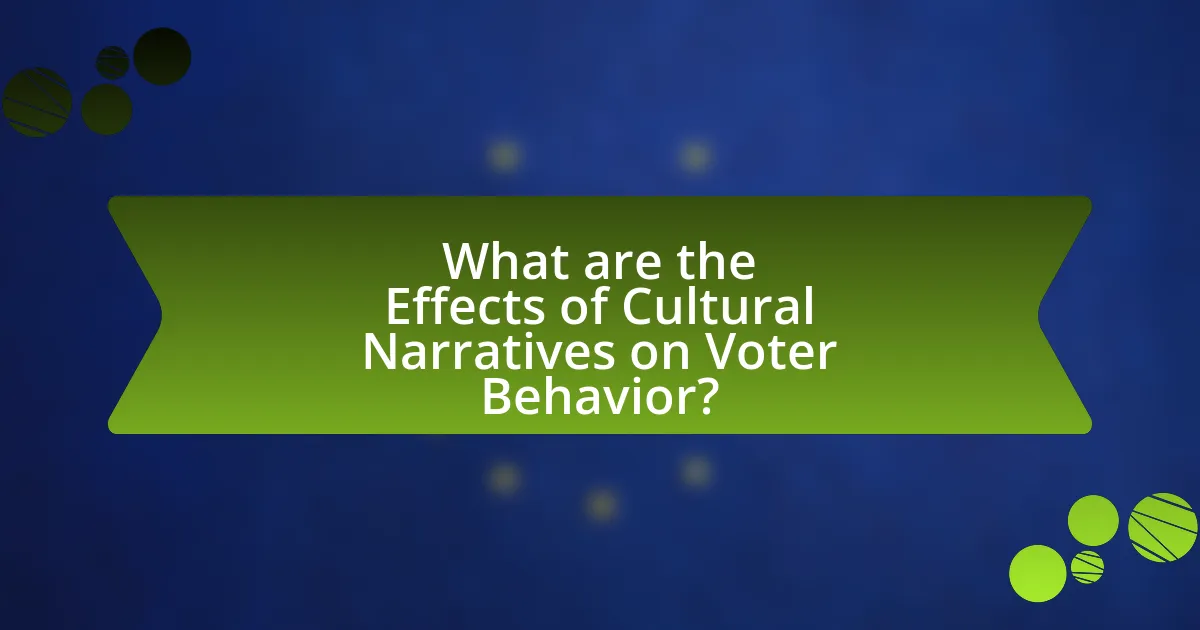
What are the Effects of Cultural Narratives on Voter Behavior?
Cultural narratives significantly influence voter behavior by shaping individuals’ perceptions, values, and decision-making processes. These narratives provide a framework through which voters interpret political messages, often aligning their choices with the stories that resonate with their cultural identity. For instance, research by the Pew Research Center indicates that voters are more likely to support candidates who reflect their cultural values and narratives, demonstrating that cultural alignment can sway electoral outcomes. Additionally, cultural narratives can mobilize specific demographics, as seen in the 2008 and 2012 U.S. presidential elections, where narratives around hope and change resonated deeply with younger voters, leading to increased voter turnout in those demographics.
How do cultural narratives affect voter engagement and turnout?
Cultural narratives significantly influence voter engagement and turnout by shaping individuals’ perceptions and motivations regarding political participation. These narratives create a shared understanding of political issues, often framing them in ways that resonate with specific cultural identities and values. For instance, research indicates that narratives emphasizing civic duty and community involvement can enhance voter turnout by fostering a sense of belonging and responsibility among individuals within those cultural contexts. A study by the Pew Research Center found that voters who identify strongly with their cultural narratives are more likely to participate in elections, demonstrating a direct correlation between cultural identity and electoral engagement.
What demographic factors influence the reception of cultural narratives?
Demographic factors such as age, gender, ethnicity, education level, and socioeconomic status significantly influence the reception of cultural narratives. For instance, younger individuals may resonate more with contemporary cultural themes, while older demographics might prefer traditional narratives. Gender differences can also affect narrative interpretation, as studies show that women and men may respond differently to themes of empowerment or conflict. Ethnic background plays a crucial role, as cultural narratives often reflect the values and experiences of specific groups, leading to varied interpretations based on shared identity. Education level impacts critical engagement with narratives; individuals with higher education may analyze cultural messages more deeply. Socioeconomic status can determine access to diverse narratives, influencing exposure and acceptance. Research indicates that these demographic factors shape not only individual preferences but also collective cultural understanding, thereby affecting how political messages are framed and received within different communities.
How do cultural narratives impact voter decision-making processes?
Cultural narratives significantly influence voter decision-making processes by shaping individuals’ perceptions, values, and beliefs regarding political issues and candidates. These narratives provide a framework through which voters interpret information, often leading them to align their choices with the stories that resonate with their cultural identity. For instance, research by the Pew Research Center indicates that voters are more likely to support candidates who reflect their cultural values and narratives, demonstrating that cultural alignment can sway electoral outcomes. Additionally, cultural narratives can create emotional connections, making voters more receptive to specific political messages, thereby impacting their final decisions at the polls.
What are the potential risks of relying on cultural narratives in political messaging?
Relying on cultural narratives in political messaging poses several risks, including oversimplification of complex issues and alienation of diverse voter groups. Political messages that depend heavily on cultural narratives may reduce nuanced topics to binary choices, leading to misinterpretation and misunderstanding among the electorate. For instance, during the 2016 U.S. presidential election, candidates who utilized cultural narratives often polarized voters, as seen in the divisive rhetoric surrounding immigration and national identity. This reliance can also marginalize voices that do not fit the dominant narrative, resulting in decreased voter engagement from those who feel excluded. Furthermore, cultural narratives can perpetuate stereotypes, which may reinforce existing biases and hinder constructive dialogue on critical issues.
How can cultural narratives perpetuate stereotypes or biases?
Cultural narratives can perpetuate stereotypes or biases by framing groups in a way that reinforces existing prejudices. These narratives often rely on simplified and exaggerated portrayals of individuals based on their ethnicity, gender, or socioeconomic status, which can lead to widespread acceptance of these stereotypes as truths. For example, media representations frequently depict certain racial groups as criminals or others as overly submissive, shaping public perception and influencing political discourse. Research by the American Psychological Association indicates that repeated exposure to biased narratives can significantly affect attitudes and behaviors, leading to discrimination and social division.
What are the ethical considerations in using cultural narratives for political gain?
Using cultural narratives for political gain raises significant ethical considerations, primarily concerning manipulation, representation, and authenticity. Manipulation occurs when political entities exploit cultural narratives to mislead or coerce public opinion, undermining democratic processes. Representation issues arise when these narratives fail to accurately reflect the diverse voices within a culture, leading to marginalization of certain groups. Authenticity is compromised when political actors selectively use cultural elements to serve their agendas, distorting the original meaning and context. For instance, the appropriation of indigenous symbols in political campaigns can lead to a superficial understanding of complex cultural histories, as seen in various political movements worldwide. These ethical concerns highlight the need for responsible engagement with cultural narratives to ensure they are used in a manner that respects the integrity and diversity of the cultures they represent.
What best practices can political communicators adopt regarding cultural narratives?
Political communicators should adopt the best practice of aligning their messaging with the cultural narratives that resonate with their target audience. This alignment enhances relatability and engagement, as evidenced by research indicating that messages congruent with cultural values are more persuasive. For instance, a study published in the Journal of Communication found that political messages that reflect the cultural identity of the audience significantly increase message acceptance and support for the communicator’s agenda. Additionally, utilizing storytelling techniques that incorporate local customs and shared experiences can further strengthen the connection between the communicator and the audience, making the political message more impactful.
How can politicians effectively align their messages with cultural narratives?
Politicians can effectively align their messages with cultural narratives by understanding and integrating the values, beliefs, and experiences that resonate with their target audience. This alignment can be achieved through thorough research into the cultural context, utilizing storytelling techniques that reflect shared experiences, and employing language that resonates emotionally with constituents. For instance, studies show that political campaigns that incorporate local cultural references and narratives tend to engage voters more effectively, as seen in Barack Obama’s 2008 campaign, which utilized themes of hope and change that aligned with the American Dream narrative. By tapping into these cultural narratives, politicians can create a sense of connection and relevance, ultimately enhancing their message’s impact.
What strategies can be employed to ensure cultural sensitivity in political messaging?
To ensure cultural sensitivity in political messaging, employing strategies such as inclusive language, understanding cultural contexts, and engaging with diverse communities is essential. Inclusive language avoids stereotypes and promotes respect, while understanding cultural contexts helps tailor messages that resonate with specific audiences. Engaging with diverse communities through consultations or focus groups allows political entities to gather insights and feedback, ensuring that messaging aligns with the values and beliefs of different cultural groups. Research indicates that political campaigns that prioritize cultural sensitivity can enhance voter trust and engagement, as seen in the 2020 U.S. elections where candidates who addressed diverse cultural narratives effectively connected with a broader electorate.
